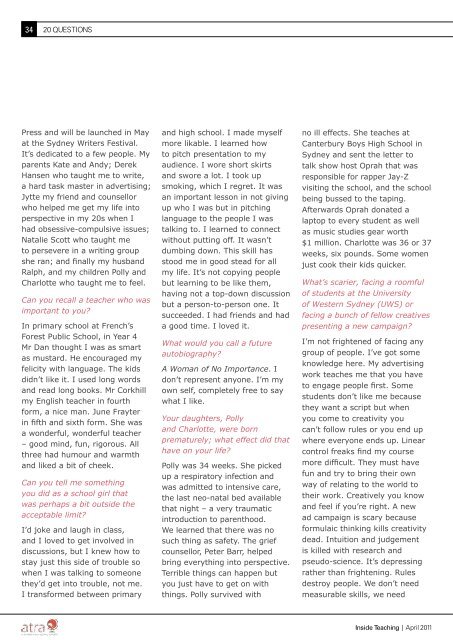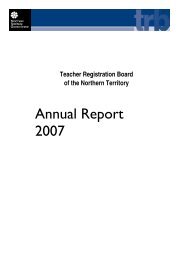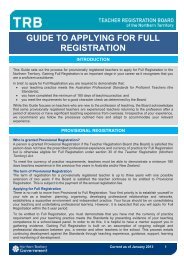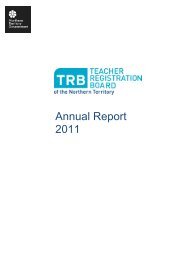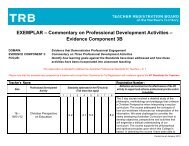First year out Five top tips from Phil Beadle Teacher preparation ...
First year out Five top tips from Phil Beadle Teacher preparation ...
First year out Five top tips from Phil Beadle Teacher preparation ...
You also want an ePaper? Increase the reach of your titles
YUMPU automatically turns print PDFs into web optimized ePapers that Google loves.
34 20 QUESTIONS 20 QUESTIONS 35<br />
Press and will be launched in May<br />
at the Sydney Writers Festival.<br />
It’s dedicated to a few people. My<br />
parents Kate and Andy; Derek<br />
Hansen who taught me to write,<br />
a hard task master in advertising;<br />
Jytte my friend and counsellor<br />
who helped me get my life into<br />
perspective in my 20s when I<br />
had obsessive-compulsive issues;<br />
Natalie Scott who taught me<br />
to persevere in a writing group<br />
she ran; and finally my husband<br />
Ralph, and my children Polly and<br />
Charlotte who taught me to feel.<br />
Can you recall a teacher who was<br />
important to you?<br />
In primary school at French’s<br />
Forest Public School, in Year 4<br />
Mr Dan thought I was as smart<br />
as mustard. He encouraged my<br />
felicity with language. The kids<br />
didn’t like it. I used long words<br />
and read long books. Mr Corkhill<br />
my English teacher in fourth<br />
form, a nice man. June Frayter<br />
in fifth and sixth form. She was<br />
a wonderful, wonderful teacher<br />
– good mind, fun, rigorous. All<br />
three had humour and warmth<br />
and liked a bit of cheek.<br />
Can you tell me something<br />
you did as a school girl that<br />
was perhaps a bit <strong>out</strong>side the<br />
acceptable limit?<br />
I’d joke and laugh in class,<br />
and I loved to get involved in<br />
discussions, but I knew how to<br />
stay just this side of trouble so<br />
when I was talking to someone<br />
they’d get into trouble, not me.<br />
I transformed between primary<br />
and high school. I made myself<br />
more likable. I learned how<br />
to pitch presentation to my<br />
audience. I wore short skirts<br />
and swore a lot. I took up<br />
smoking, which I regret. It was<br />
an important lesson in not giving<br />
up who I was but in pitching<br />
language to the people I was<br />
talking to. I learned to connect<br />
with<strong>out</strong> putting off. It wasn’t<br />
dumbing down. This skill has<br />
stood me in good stead for all<br />
my life. It’s not copying people<br />
but learning to be like them,<br />
having not a <strong>top</strong>-down discussion<br />
but a person-to-person one. It<br />
succeeded. I had friends and had<br />
a good time. I loved it.<br />
What would you call a future<br />
autobiography?<br />
A Woman of No Importance. I<br />
don’t represent anyone. I’m my<br />
own self, completely free to say<br />
what I like.<br />
Your daughters, Polly<br />
and Charlotte, were born<br />
prematurely; what effect did that<br />
have on your life?<br />
Polly was 34 weeks. She picked<br />
up a respiratory infection and<br />
was admitted to intensive care,<br />
the last neo-natal bed available<br />
that night – a very traumatic<br />
introduction to parenthood.<br />
We learned that there was no<br />
such thing as safety. The grief<br />
counsellor, Peter Barr, helped<br />
bring everything into perspective.<br />
Terrible things can happen but<br />
you just have to get on with<br />
things. Polly survived with<br />
no ill effects. She teaches at<br />
Canterbury Boys High School in<br />
Sydney and sent the letter to<br />
talk show host Oprah that was<br />
responsible for rapper Jay-Z<br />
visiting the school, and the school<br />
being bussed to the taping.<br />
Afterwards Oprah donated a<br />
lap<strong>top</strong> to every student as well<br />
as music studies gear worth<br />
$1 million. Charlotte was 36 or 37<br />
weeks, six pounds. Some women<br />
just cook their kids quicker.<br />
What’s scarier, facing a roomful<br />
of students at the University<br />
of Western Sydney (UWS) or<br />
facing a bunch of fellow creatives<br />
presenting a new campaign?<br />
I’m not frightened of facing any<br />
group of people. I’ve got some<br />
knowledge here. My advertising<br />
work teaches me that you have<br />
to engage people first. Some<br />
students don’t like me because<br />
they want a script but when<br />
you come to creativity you<br />
can’t follow rules or you end up<br />
where everyone ends up. Linear<br />
control freaks find my course<br />
more difficult. They must have<br />
fun and try to bring their own<br />
way of relating to the world to<br />
their work. Creatively you know<br />
and feel if you’re right. A new<br />
ad campaign is scary because<br />
formulaic thinking kills creativity<br />
dead. Intuition and judgement<br />
is killed with research and<br />
pseudo-science. It’s depressing<br />
rather than frightening. Rules<br />
destroy people. We don’t need<br />
measurable skills, we need<br />
innovation and new ideas, a bit<br />
of irreverence and naughtiness.<br />
Do you use humour as a teaching<br />
tool?<br />
Humour is how you connect.<br />
It’s ab<strong>out</strong> revealing your own<br />
humanity. I’m incapable of not<br />
telling people who I am. I get<br />
a lot of laughter by just saying<br />
what I think. Some of the<br />
laughter is <strong>from</strong> shock but what’s<br />
the point in conversing if you<br />
don’t say what you think?<br />
Who would you most like to get<br />
in to talk to your students at<br />
UWS?<br />
Aung San Suu Kyi probably,<br />
or Germaine Greer. Greer is<br />
fantastic, although I don’t agree<br />
with everything she says. Chris<br />
Hitchens is incisive, intelligent<br />
and human. His use of language<br />
is precise, economical. Stephen<br />
Fry. Richard Dawkins.<br />
If you were back hosting Life<br />
Matters, what team would you<br />
put together to debate the<br />
public/private funding of schools<br />
issue and why these people?<br />
On the public side, the president<br />
of the Australian College of<br />
Educators Lyndsay Connors,<br />
Chris Bonnor, John Kay, Ross<br />
Gittens. Private? Maybe some<br />
of the private school principals,<br />
Judith Poole <strong>from</strong> Abbotsleigh<br />
school, say, or Shore’s Timothy<br />
Wright. The trouble is most<br />
people talk crap when it comes<br />
to funding. I’d include Michael<br />
inside teaching | April 2011 www.atra.edu.au | insideteaching@atra.edu.au<br />
Duffy and John Howard – at least<br />
Howard is smart.<br />
Your main argument in The<br />
Stupid Country, co-written with<br />
Chris Bonnor, is that choice turns<br />
the public system into a poor<br />
option, and sometimes a very<br />
poor option. Can you explain this<br />
process?<br />
Society is not obliged to provide<br />
everyone with choice but<br />
governments have an obligation<br />
to provide excellent education,<br />
free of charge to every child. If<br />
people want to buy an advantage<br />
for their child, they can pay for it<br />
as happens in most democracies,<br />
but frankly it probably doesn’t<br />
matter that much at all. Their<br />
kids will do as well wherever<br />
they go. We’ve confused people<br />
ab<strong>out</strong> what schools do. Parents<br />
are ultimately responsible for<br />
what kids achieve, not schools.<br />
Kids who grasp opportunities<br />
wherever they go to school are<br />
the ones who’ll do well, but it’s<br />
unfair if <strong>from</strong> the age of five<br />
differences are exacerbated so<br />
that everything goes against<br />
them. The less fortunate should<br />
have more opportunity, not less.<br />
What are a school’s most<br />
important assets?<br />
<strong>Teacher</strong>s and students. The<br />
teachers and the principal create<br />
the character of a school. There<br />
are good in both public and<br />
private schools. They are warm,<br />
energetic, everyday people. They<br />
don’t have to be inspirational,<br />
rather commonsensical.<br />
The public school is the last<br />
institution that can’t file a child<br />
down because they have a legal<br />
obligation to educate. They do a<br />
welfare job to keep at-risk kids<br />
hanging on in there. The public<br />
school system shouldn’t be<br />
despised for doing this.<br />
I mentioned my daughter<br />
and the Oprah donation to<br />
Canterbury Boys High earlier.<br />
The value wasn’t just in the stuff<br />
donated but in the recognition<br />
that the students’ futures and<br />
opportunities mattered. Trinity<br />
Grammar, say, or Abbotsleigh<br />
are not more important even if<br />
they’re the schools governments<br />
help first. Oprah and Jay-Z<br />
showed these kids that they<br />
mattered. We shouldn’t walk<br />
away <strong>from</strong> them.<br />
If you were going to send a copy<br />
of The Stupid Country to Julia<br />
Gillard what inscription would<br />
you put in it?<br />
‘S<strong>top</strong> playing politics with<br />
the most vulnerable and<br />
disadvantaged. Be the first to<br />
stand up for them because no<br />
one else has.’ She’s been sent<br />
ab<strong>out</strong> 35 copies; I doubt she’s<br />
read any.<br />
Thank you, Jane Caro.<br />
David Rish is an award-winning<br />
writer for children and a regular<br />
contributor to Inside Teaching.<br />
* Okay, okay, if you counted the<br />
questions you’d know there are<br />
fewer than 20.<br />
Image by Gregory Myer.


